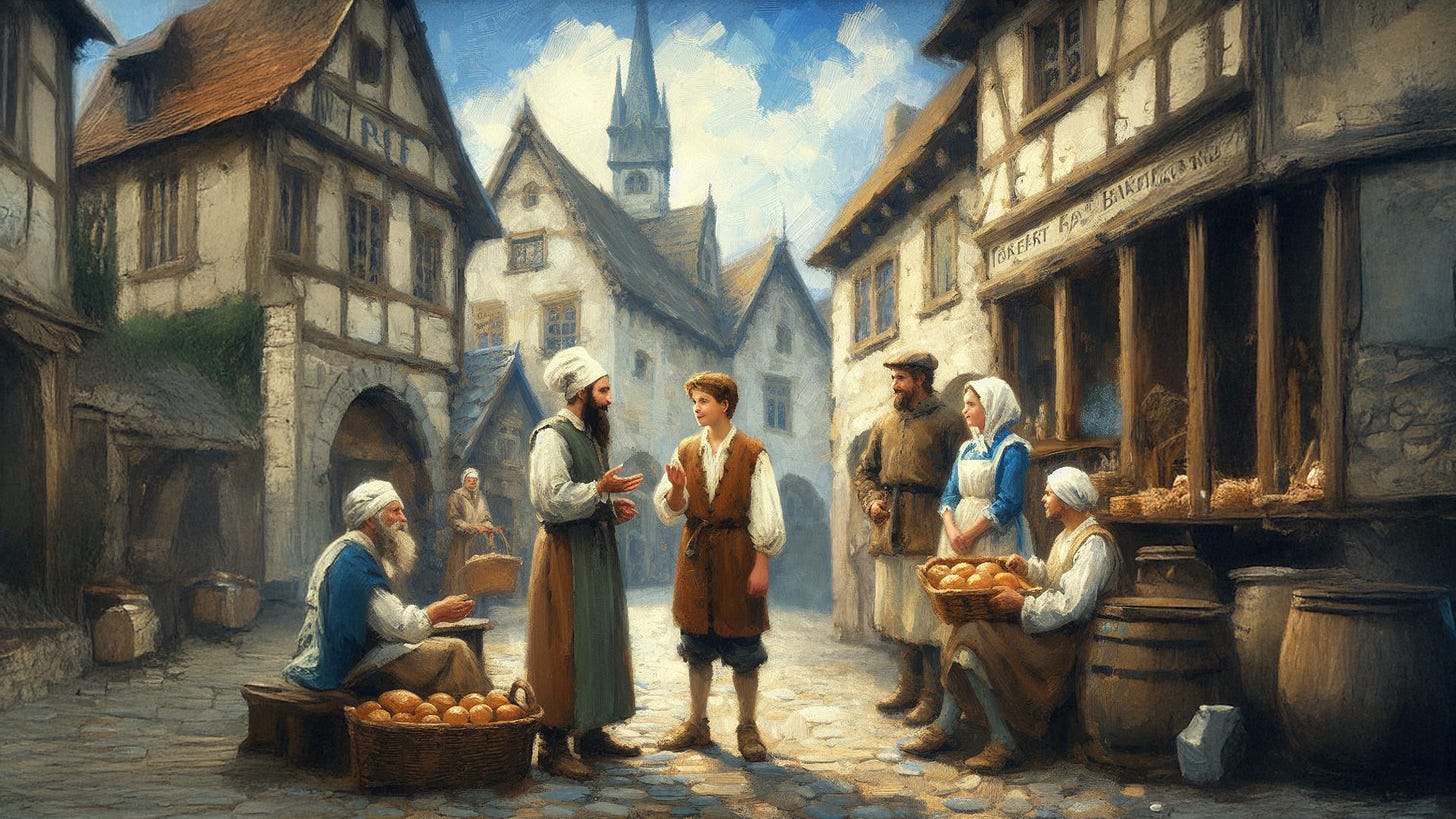He Could Heal a Village with a Story—Until He Couldn’t
Burned Out? This Fantasy Story Might Help You
A Boy of Many Failures
He wasn’t good at baking.
The loaves burned. The buns collapsed. The baker’s wife nearly singed her eyebrows when he left the oven door open. Woodwork? Worse. Every stool he made wobbled. Every door he hung squeaked. No matter the trade, he never lasted long.
And yet, he always found his way to the next village.
Not because he was skilled. But because every time he got fired, he spun a story.
“Oh, the bakery? A lesson in patience, really. Never ignore the oven’s whispers—they sound a lot like life. If you don’t listen, something burns.”
He turned failures into fables. His missteps became parables with a smile and a wink. People laughed. Or sighed. Or offered him bread and pointed him to the next town.
Without ever planning to, the boy became a storyteller.
The Tales That Healed
He wandered from hill to hamlet, swapping stories for soup and shelter. People welcomed him with warm meals and heavy hearts. During dinner, they spilled their troubles—droughts, fires, brigands, lost sheep, lost sleep.
And every night, the storyteller climbed atop a barrel or hearthstone and wove their pain into wonder. He never used names. But somehow, everyone saw themselves in the stories.
They laughed. They wept. They found comfort.
The storyteller came to believe it was his calling—his gift—to give people courage and hope through stories.
So he traveled farther. Slept less. Told more tales.
A Candle Burned Too Low
He grew famous. And thin.
His feet ached from endless roads. Sleep fled, chased away by ideas that clawed at him in the dark. Wherever he went, people gathered not just to listen—but to be listened to.
Even doctors.
Once, hobbling on an infected foot, he visited a healer. The man recognized him at once. “Tell me a story,” the doctor begged. “Give me hope.”
He did.
And left untreated.
He kept going.
Even when the stories stopped.
It happened one evening in a crowded tavern. He sat among villagers at supper—but their voices became noise. Too many tales. Too many sorrows. His soul, swollen with burdens, couldn’t take another.
When they turned to him for the evening’s tale, he opened his mouth—
and nothing came.
They waited. Then frowned. Then whispered.
The Spark That Wouldn’t Light
He tried harder.
He retold old tales. Copied his past rhythms. But the spark was gone. His words rang hollow, no longer echoing the people’s pain. So he did the unthinkable.
He chased danger.
He stepped into a wildfire, hoping the fear would inspire him. He rowed toward a flooded rooftop, trying to save someone—though he was no sailor.
He nearly died. Twice.
And still, no stories came.
Until one day, shivering at the edge of a mossy wood, soaked and starving, he saw an old man in a cloak with a white beard and kind eyes.
The man sat beside him. Didn’t ask for a story.
He listened.
Then, gently, he helped the storyteller to his feet and took him to a nearby inn. He ordered stew, hot bread, a bath, and a doctor. He paid the innkeeper and whispered, “Make sure he’s well.”
The next morning, the storyteller woke warm and whole. The pain in his foot had vanished.
The only thing missing was the monk.
Footsteps in the Silence
The monk was gone.
So the storyteller followed.
From town to town, he chased the white-bearded man’s trail. Everywhere he went, people spoke of the monk’s kindness, his story-magic, the way his words left behind peace.
And in every village, the storyteller felt smaller.
Why couldn’t he be like that?
So wise. So giving. So tireless.
He nearly set off again—same path, same mistake—ready to burn out all over again.
But the monk found him first.
“Come,” he said, “there’s another way.”
The Season of Stillness
The monastery sat cradled in green hills, a place of bells, bees, and wind in the grass.
The storyteller chafed. He paced. He fretted.
“I should be helping,” he told the monk. “There are people who need me.”
The monk smiled.
“Even the sun takes a season to rest.”
So the storyteller sat. He prayed. He listened—not for new tales, but to the long quiet inside himself.
He sang in the chapel, gardened with the brothers, read old scrolls by candlelight. He watched others return from the road with stories—but for once, he didn’t envy them.
The ache faded.
The silence healed him.
The Legacy Continues
The monk passed away that winter.
Come spring, the storyteller—now grey-bearded himself—gathered his cloak and set off once more.
He told stories again. Real ones. True and warm, shaped not from haste but from rest. He built quiet into his journeys, knowing now the seasons of giving and the seasons of receiving.
One evening, on a misty roadside, he found a young woman curled beside her harp.
Her eyes were tired. Her voice was gone.
“I used to sing songs that made people smile,” she whispered. “Now I can’t sing at all.”
He didn’t speak right away.
He sat beside her.
And listened.
Then he smiled.
“Come with me,” he said. “There’s a place I know.”
Epilogue: For Those Who Carry Light
This story is for the ones who brighten the world with their words, songs, or care.
The ones who give, and give, and forget to rest.
You are not broken. You are wintering.
Let this be your inn. Let this be your warmth.
Your stories will return—when you do.






Came just when I needed it. Thank you. I have been trying to force something and getting nothing or stalling just when I think I have found it.
Beautiful. This is a great story about remembering that everyone needs to recharge now and then, to be filled so that they can empty themselves for others.